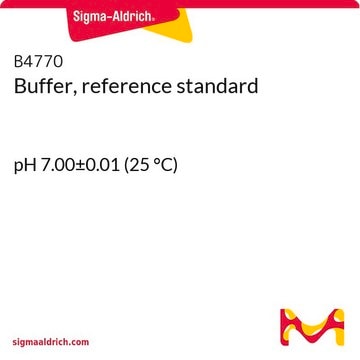1.09889
Buffer concentrate
(boric acid/potassium chloride/sodium hydroxide), traceable to SRM of NIST and PTB for 500 ml buffer solution, pH 9.00 ± 0.02 (20°C) Titrisol®
Synonym(s):
Buffer concentrate for 500 ml buffer solution, pH 9.00 ± 0.02 (20°C)
About This Item
Recommended Products
grade
analytical standard
Quality Level
Agency
according to DIN 19266
product line
Titrisol®
pH
8.9 (20 °C in H2O)
density
1.00 g/cm3 at 20 °C
application(s)
environmental
food and beverages
general analytical
industrial qc
pharmaceutical
format
mixture
storage temp.
15-25°C
Related Categories
General description
Application
- Buffer concentrate in viral nucleic acid preamplification: A study utilized buffer concentrate in various viral nucleic acid preamplification pipelines for sewage viral metagenomics, enhancing the accuracy and efficiency of viral detection methods (Fernandez-Cassi and Kohn, 2024).
- Buffer concentrate in myocardial slice cultures: Research on rabbit myocardial slices demonstrated the critical role of buffer concentrate in maintaining tissue stability and function under various experimental conditions, crucial for physiological studies (Baron et al., 2024).
- Buffer concentrate in fluorescence spectroscopy: A study explored the interaction of erythrosine B with cardiac drugs, using buffer concentrate to stabilize reaction conditions in fluorescence, scattering, and absorbance spectroscopy (AlSalem et al., 2024).
- Buffer concentrate in solid-state NMR: The quantification of residual water in pharmaceutical solutions was improved using buffer concentrate in solid-state NMR, highlighting its importance in ensuring the quality and stability of pharmaceutical formulations (Du and Su, 2024).
- Buffer concentrate in electrochemical detection: Buffer concentrate facilitated the electrochemical detection of iodide in nuclear emergency tablets, proving essential for precise and reliable analytical applications in emergency response scenarios (Alqibthiyah et al., 2024).
Features and Benefits
- Traceable to primary standard reference materials from NIST and PTB
- Analytical standard Grade
- Uncertainty data and traceability are documented in a comprehensive and batch-specific Certificate of Analysis.
Analysis Note
Measured after dilution to 500 ml with a combination glass electrode after multiple point calibration (according to DIN 19268) with reference materials for the preparation of standard buffer solutions according to DIN 19266.
Legal Information
standard
Signal Word
Danger
Hazard Statements
Precautionary Statements
Hazard Classifications
Repr. 1B
Storage Class Code
6.1D - Non-combustible, acute toxic Cat.3 / toxic hazardous materials or hazardous materials causing chronic effects
WGK
WGK 1
Flash Point(F)
Not applicable
Flash Point(C)
Not applicable
Regulatory Listings
Regulatory Listings are mainly provided for chemical products. Only limited information can be provided here for non-chemical products. No entry means none of the components are listed. It is the user’s obligation to ensure the safe and legal use of the product.
EU REACH SVHC Candidate List
EU REACH Annex XVII (Restriction List)
Certificates of Analysis (COA)
Search for Certificates of Analysis (COA) by entering the products Lot/Batch Number. Lot and Batch Numbers can be found on a product’s label following the words ‘Lot’ or ‘Batch’.
Already Own This Product?
Find documentation for the products that you have recently purchased in the Document Library.
Customers Also Viewed
Our team of scientists has experience in all areas of research including Life Science, Material Science, Chemical Synthesis, Chromatography, Analytical and many others.
Contact Technical Service






